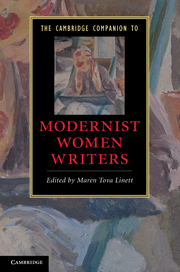Book contents
- Frontmatter
- Modernist women’s literature: an introduction
- 1 Transforming the novel
- 2 Modernist women poets and the problem of form
- 3 Women’s modernism and performance
- 4 Magazines, presses, and salons in women’s modernism
- 5 Gender in women’s modernism
- 6 Black women’s modernist literature
- 7 Race and ethnicity in white women’s modernist literature
- 8 Geomodernism, postcoloniality, and women’s writing
- 9 Women modernists and visual culture
- 10 Modernism and trauma
- 11 Political activism and women’s modernism
- 12 Religion and the occult in women’s modernism
- Guide to further reading
- Index
2 - Modernist women poets and the problem of form
Published online by Cambridge University Press: 28 November 2010
- Frontmatter
- Modernist women’s literature: an introduction
- 1 Transforming the novel
- 2 Modernist women poets and the problem of form
- 3 Women’s modernism and performance
- 4 Magazines, presses, and salons in women’s modernism
- 5 Gender in women’s modernism
- 6 Black women’s modernist literature
- 7 Race and ethnicity in white women’s modernist literature
- 8 Geomodernism, postcoloniality, and women’s writing
- 9 Women modernists and visual culture
- 10 Modernism and trauma
- 11 Political activism and women’s modernism
- 12 Religion and the occult in women’s modernism
- Guide to further reading
- Index
Summary
In A Room of One's Own, Woolf articulated the famous claim now so familiar that regrettably, it has lost some of its former luster and edge: “For we think back though our mothers if we are women.” Alicia Ostriker suggests that Woolf's claim compels in part because of her “mysterious” invented verb - we wonder what it is to “'think back'” through “something, another person, a set of people.” I would add that Woolf's verb also elicits the question of what it is to “think through” something or someone at all. In our time, as Ostriker suggests, it is the women writers of Woolf's own modernist generation through whom writers and critics, women and men, can now “think back.” In 1986, Ostriker was reiterating with a difference what Woolf had emphasized in 1929: that it was “difficult to discover who our mothers are, much less think through them, thanks to a long history of criticism . . . that veils them from us.” Fortunately, a wealth of watershed feminist recuperative criticism of the past three decades has now brought to wide critical awareness the women “makers of modernism,” “forgotten” by mid-twentieth-century chronicles of modernism's development, and has argued convincingly for their centrality to modernist practice. Thanks to pioneering critics such as Ostriker herself, Susan Stanford Friedman, Shari Benstock, and Rachel Blau DuPlessis, we can now easily survey a canon of modernist women writers, think through them, and reconsider what they themselves thought by way of - in Woolf's formulation, “what food” sustained these “women as artists.”
- Type
- Chapter
- Information
- The Cambridge Companion to Modernist Women Writers , pp. 33 - 46Publisher: Cambridge University PressPrint publication year: 2010

